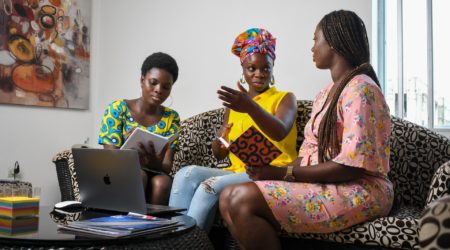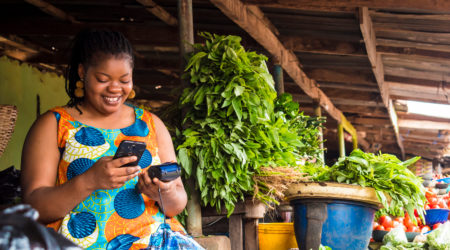For a just and adaptive future, climate action in Africa needs to lift up young women

Women and girls are the most powerful actors for climate change in Africa. Young women are at the forefront of climate action, leading initiatives and advocating for policy change in their communities and at the macro level. Women are well-positioned to inform livelihood strategies that can be adaptive to changing environmental realities because of their established roles in households and communities as stewards of resources and bearers of knowledge.
Women and girls disproportionally bear the cost of climate change
The interlinked challenges of climate change and gender justice are arguably most evident in Africa. Women and girls have less education, lack proper healthcare, and have fewer digital tools, yet they comprise half of Africa’s population. These vulnerabilities highlight that women are especially susceptible to the impacts of climate change, as their livelihoods depend on natural resources that are threatened by its effects. The structural inequalities women face in society also make them less able to cope and adapt – a 33% mobile money gender gap in LMIC countries for example, leaves women with less access to lifelines like digital financial services. Additionally, women have less control over income and fewer productive assets, including irrigation and property rights, climate information, and seeds. These restrictions limit women’s options to adapt to farm-related activities.
Young women are authentic advocates who take action
Youth have the most to lose when faced with climate change. Due to inadequate access to land, credit, and loans, they are particularly vulnerable to climate shocks.
To tackle this situation, young women are spearheading and mobilizing action. Five of the seven members of the UN Advisory Group on Climate Change are young women, as are 10 of the 17 members of the Young Leaders for the SDGs.
Rachel Nabunya Kisakye, formerly a UN Young Leader, is a project engineer in Uganda who became a climate activist in 2018. She developed a unique bio-latrine technology to address soil degradation, inadequate sanitation, and clean energy. The bio-latrine concept was inspired by the heavy burden African women face in providing food for their families because they were not harnessing an easily available energy source to fulfill this need. From where she was sitting, Rachel could see how to tailor a multi-pronged solution to address the interrelated issues while improving the wellbeing of women and protecting the health of the community and the soil, the latter which is a key determinant of livelihood.
Increasing women’s land rights accelerates adaptation and resilience
In its 2009 land declaration, the African Union recommended that its member states allocate a minimum of 30% of land to women. Nevertheless, women frequently have minimal influence on managing local resources, because they lack land rights. The inequity of women in fisheries despite their penchant for improved governance and conservation is a notable example. Yet, evidence links strong adaptation planning to women’s access to land rights and decision-making around land use. In Kenya, a project funded through the Africa Development Bank’s Adaptation Acceleration Fund, supported 150 women in one of the driest parts of Kenya to own land. As a result, the women adapted resilient farming methods that could withstand drought and flooding and benefiting their communities.
Women are critical to food security and building more resilient agriculture
Women represent 60% of the agricultural workforce. Moreover, they manage 70% of smallholder agriculture in Africa by conserving native seeds, caring for livestock, processing food, and selling at local markets. Yet, there remains a food crisis in many of the continent’s regions. The UNDP calculates that if women farmers were given the same access to resources (such as land and credit) as men, national agricultural production could rise from 2.5 to 4 percent, and the number of malnourished people could be reduced from 12 to 17 percent.
We Are the Solution is a campaign led by rural women in West Africa to restore knowledge of ancestral food production, land stewardship and provide nutritious food to those in need. This campaign ensures food sovereignty and self-sufficiency through the adequate control of seeds; the basis of any agricultural food producer. Through workshops, forums, and community radio, “We Are the Solution” disseminates its vision to various communities. It also supports the purchasing of farms where the land is collectively managed. In a space where historically, women’s voices have been excluded, this program empowers women by including them in the decision-making process regarding food security and building resilient agriculture.
A way forward: Towards meaningful engagement with young women
In order to leverage women as change agents, we need to allow them to fully be in the driver’s seat. But this entails acknowledging that our fundamental approach and understanding of ‘engagement’ is flawed. To do so, we need to shift our approach so that:
- Women are viewed and allowed to be co-creators of solutions rather than solely seen as beneficiaries. The beneficiary role denotes passivity, yet women continue to be a key driving force in social, political, and economic movements around the continent.
- We approach engagement in a manner that is not exploitative or extractive. This means that when working with women, we view them as equal partners throughout the entire process, from inception to implementation, rather than merely treating them as sources of information that we extract knowledge from and then exclude. We should value their perspectives and actively learn from their experiences.
Engagement at the nexus between gender justice and climate action
We need to take a critical look at how we work, be willing to evolve, and build our engagement models with women. This could mean shifting our funding models to be accessible to local, grassroots women who have firsthand experience and knowledge and can conceptualize and drive projects. This entails co-creating interventions and priority actions with grassroots women, relying on their guidance and expertise to develop acceptable, contextually appropriate, and possibly more effective interventions. To effectively address climate change, it is crucial that we adopt a deliberate and concerted effort to overcome the historical power imbalance. We must prioritize young women and support them to realize their full potential while building their local communities.
When we leverage women as change agents, a more equal, sustainable future is within our reach. Feminist climate action is just climate action. A gendered approach is crucial for resilience and overcoming inequalities and power imbalances so that we can achieve real action on climate change for everyone.
Dr. Yvonne Maingey-Muriuki is a consulting associate for BFA Global. She is a young African leader in Climate Change and Sustainability, developing measurable sustainability strategies that lead to impactful change, driving stakeholder alignment across different sectors, and supporting diverse businesses in translating their strategies into action. Dr. Maingey-Muriuki is a strategic technical advisor to multiple organizations including Diageo, Oxfam International, DFID, United Nations, and others. She holds a PhD in Climate Change and Adaptation from the University of Nairobi and a Doctoral Fellowship in Climate Change History and the Future of Global Governance from Columbia University. She completed her Master of Arts (Environmental Education) from New York University summa cum laude and a Bachelor of Laws (LLB), from the London School of Economics and Political Science.



